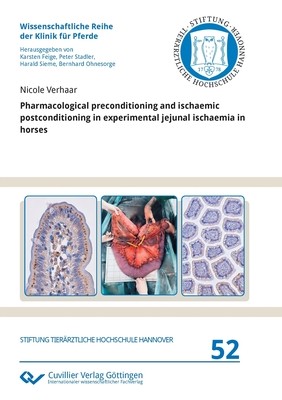
- We will send in 10–14 business days.
- Author: Nicole Verhaar
- Publisher: Cuvillier
- ISBN-10: 3736974337
- ISBN-13: 9783736974333
- Format: 14.8 x 21 x 0.8 cm, softcover
- Language: English
- SAVE -10% with code: EXTRA
Pharmacological preconditioning and ischaemic postconditioning in experimental jejunal ischaemia in horses (e-book) (used book) | bookbook.eu
Reviews
Description
Strangulating obstruction of the small intestine in the horse is associated with a high mortality rate. Although many intestinal lesions can be treated surgically, more effective strategies are needed to decrease the occurrence of complications related to the intestinal segments that are not amenable to intestinal resection. The aim of this PhD was to determine the feasibility and effect of two novel treatment modalities in equine small intestinal ischaemia. Therefore, ischaemic postconditioning and pharmacological preconditioning with lidocaine and xylazine were investigated in two experimental in vivo studies. By evaluating different variables for intestinal ischaemia reperfusion injury by use of histomorphology, immunohistochemistry and biochemical analysis, the results of this study demonstrate the applicability of these treatments in experimental small intestinal ischaemia in horses.
EXTRA 10 % discount with code: EXTRA
The promotion ends in 19d.22:13:42
The discount code is valid when purchasing from 10 €. Discounts do not stack.
- Author: Nicole Verhaar
- Publisher: Cuvillier
- ISBN-10: 3736974337
- ISBN-13: 9783736974333
- Format: 14.8 x 21 x 0.8 cm, softcover
- Language: English English
Strangulating obstruction of the small intestine in the horse is associated with a high mortality rate. Although many intestinal lesions can be treated surgically, more effective strategies are needed to decrease the occurrence of complications related to the intestinal segments that are not amenable to intestinal resection. The aim of this PhD was to determine the feasibility and effect of two novel treatment modalities in equine small intestinal ischaemia. Therefore, ischaemic postconditioning and pharmacological preconditioning with lidocaine and xylazine were investigated in two experimental in vivo studies. By evaluating different variables for intestinal ischaemia reperfusion injury by use of histomorphology, immunohistochemistry and biochemical analysis, the results of this study demonstrate the applicability of these treatments in experimental small intestinal ischaemia in horses.


Reviews